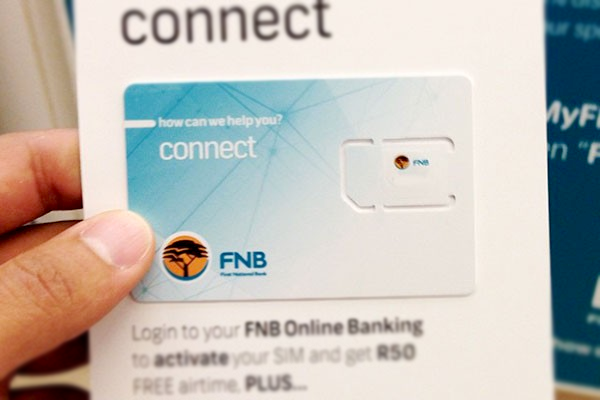FNB has inked a partnership deal with MTN to run its MVNO, FNB Connect, on MTN’s network infrastructure. This follows FNB’s first partnership with Cell C for the same service. The MVNO market seems to be growing in South Africa, but not without challenges.
South Africa’s second-largest bank by customer base, First National Bank, has signed an agreement with MTN South Africa for the supply of network services for FNB Connect, the bank’s mobile virtual network operator (MVNO).
In a statement, FNB and MTN stated that they have formed the collaboration to accelerate “access to reliable telecommunications and internet services for customers who use FNB Connect”.
“Telecoms and ICT services are central to the integrated value propositions we offer our customers across financial and lifestyle services,” said FNB CEO Jacques Celliers in the statement. “In the months ahead, we will expand our range of services by introducing more cost-effective and tailored solutions for both individual and business customers. This includes internet-of-things solutions that empower businesses to improve efficiency and productivity.”
FNB Connect already has an MVNO partnership with Cell C, which was the first mobile network operator in South Africa to introduce MVNO services. According to FNB, the Cell C partnership will run concurrently with the new MTN partnership to “[allow] customers to enjoy the best of both worlds in network quality”.
South Africa’s fledgeling MVNO landscape
Commenting on the FNB and MTN deal, Cell C’s chief officer for wholesale business, Stephen Morony, told local publication TechCentral, that they welcome the new competition in the MVNO space.
“We look forward to our continued relationship with the FNB Connect team while welcoming competition in the MVNO space. Cell C is confident that our technology platform, our extensive MVNO partner experience, range of service offerings and value propositions are competitive and will serve our varied customer segments well, enabling ever more choice for the South African consumer,” he said.
The South African MVNO industry has seen its value increase over the last few years, causing mobile network operators’ interest in offering the services to surge. FNB stated that its MVNO sold about R400-million in smartphones and other digital devices in the first half of the year. In September 2022, MTN announced its push into the business, stating that it would offer services to the likes of Mr. Price Mobile.
“We are growing that part of the business quite significantly. We are building an MVNO platform as a service[…]we have a huge pipeline of MVNOs who want to come on board. We are open for business when it comes to MVNO. We will add far more than three,” said MTN South Africa CEO Charles Molapisi at the time.
Also in September 2022, Cell C partnered with the country’s largest retail bank Capitec to launch an MVNO for the latter. Capitec is marketing the MVNO as a virtual mobile network that offers customers less expensive and perpetual data. Shoprite also launched its K’nectmobile MVNO in March 2021, supported by Cell C’s infrastructure via a roaming partnership with MTN.
In January this year, Telkom also entered the scene, announcing that it would “leverage its extensive network footprint across South Africa to offer MVNOs the opportunity to provide quality services over its network – thereby enhancing the much-needed competition in the telecoms space”.
The MVNO partnerships are in line with spectrum-licence requirements set by industry regulator ICASA for mobile network operators to benefit historically disadvantaged groups.
But what exactly is an MVNO?
An MVNO is a reseller of wireless communications services. It leases wireless capacity from a third-party mobile network operator (MNO) at wholesale prices and resells it to consumers at reduced retail prices under its business brand.
Mobile network operators benefit from leasing this capacity because it would otherwise be unused, so they gain a profit by leasing it in bulk at wholesale prices. MVNOs benefit from being able to mark down their retail prices to a certain extent because they do not have to pay radio frequency spectrum licences and have no infrastructure to build or maintain. As a result of the low overhead, they can spend aggressively on marketing to increase their chances of selling capacity to consumers.
A big market opportunity with its challenges
According to a report by Mordor Intelligence on the South African MNO – MVNO Market – Growth, Trends, COVID-19 Impact, and Forecasts (2023 – 2028), the market is expected to register a CAGR of about 7.8% during the forecast period. The growth will be mainly driven by increasing demand in a wide range of applications including retail, cellular M2M, and media and entertainment.
However, most MVNO players in South Africa, according to the report, function as wholesalers that purchase bandwidth in chunks from big carrier networks and sell at a discount to consumers. As a result, this market has a low-profit margin because the vendors offer cheaper rates to consumers by renting spectrum from major carriers which is costly.
Despite much potential, the MVNO segment has faced slow growth in recent years due to unfair pricing for network access from large network operators. This will likely be remedied by the regulator Independent Communications Authority of South Africa (ICASA)’s order to mobile network operators to reduce roaming fees, including those of MVNOs, a solution which is likely to accelerate the growth of the segment.





















